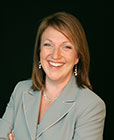2013 Conference Highlights
Q/A Session with Anne Pritchard Grady
President of Acclivity Performance
Session: Creating a Culture of Accountability

How do you evaluate or measure people you first meet?
I generally ask them questions to learn more about them. I pay attention to the way the answer the questions to give me insight into their pace and their focus. Are they more slow paced and patient in the discussion, or are they more fast paced and impatient? Do they talk about feelings and emotional things or are they more bottom line? That usually helps me narrow it down a bit. It just takes practice. I have been actively practicing this for over 12 years, and I probably get it right 75-80% of the time.
Do you have any current publications/books? No, not yet, but Iím currently writing a book! If you sign up for my blog (www.acclivityperformance.com/blog) I will keep you posted when itís coming out.
At what point can you stop analyzing/changing/working /trying to change/ someone and move on?
When I realize that Iím spending more time frustrated than I am solving the problem. When Iíve tried to assertively communicate what I want and need, and I know my expectations have been clearly defined, if they still arenít responding, I follow my mantra ďIt is what it is. They are who they areĒ. Thereís nothing you can do about their attitude or behavior, only how you react and respond to it. I know, easier said than done, but this too takes practice.
What inspires you?
My family. I have to admit, raising Evan has not been without its challenges, and I have been run down, exhausted, and frustrated many a time. But our family has grown stronger as a result. My husband is my rock, and I am incredibly blessed to have him in my life, and he brought with him to our marriage a beautiful daughter that I have the privilege of raising. My family is really what centers me.
My career. My goal is to make some kind of difference in peopleís lives. It is a privilege to meet so many amazing people. It gives me strength.
Where do you see yourself in 10 years?
I will have written my book, I will be speaking to audiences around the country, my children will be grown, happy, and healthy, and I will be traveling with my husband. I will be content.
Q/A Session with Toni Harris, Former Financial Advisor and Financial Coach
Session: Women, Money & Power

How can you find a reputable advisor? What credentials or reviews should I look for when selecting an advisor?
There are many financial advisors in the marketplace. To locate a reputable advisor can prove to be a challenge. Here are a few tips to how to find an advisor who fits your personality and style.
- A. Ask for a referral - Do your friends use an advisor? Are they a raving fan of their advisor? If so, ask them what they like about their advisor and what have they done for them above and beyond setting up accounts. Does the advisor do reviews? If so, how often? Does their advisor communicate with them on a regular basis? Ask the advisor how they are paid. Does their company pay them a commission or do you pay them a fee out of your investment. One isn't better than the other but you need to know. Also, make sure the advisor is objective and not suggesting products based on the company's offer of the month or based on commission.
- B. Interview multiple advisors prior to making a decision. The right thing to do in this process is to let the advisors know that you are interviewing multiple advisors to see which one fits your needs the most. The advisor's time is valuable and it is respectful to let them know ahead of time. Some may opt out of the process which is their prerogative; they are probably not the one you want to hire anyway.
- C. Check them out! Go to http://www.finra.org/Investors/ToolsCalculators/BrokerCheck/. Here you can see if the advisor has had any violations or complaints on their record before you decide to work with them.
If you are uninsurable due to health, how do you protect your family?
This is a tough question and the very reason for all those reading this answer to buy the most insurance you can afford while you and your spouse is insurable.
The first thing you should do is max out any employer life insurance that does not require proof of insurability. If you terminate employment or retire be sure to immediately convert the group policy to an individual policy.
You can purchase guaranteed issue life insurance that does not require proof of insurability. These policies are typically small face values (less than $25K) and as long as you live beyond the probation period (typically 2 years) then the insurance will stay in effect. Of course, you could search the Internet for a company that issues guaranteed issuer life insurance.
For more ideas on how to get insurance when you are uninsurable, read the article, 8 Ways to Find Life Insurance When You're Uninsurable by Insure.com - http://www.insure.com/articles/lifeinsurance/uninsurable.html
What do you suggest for recent graduates with a large amount of student loan debt?
I say do not put off saving until you get out of debt. Even if you have to start small, take advantage of any employer plans you may have to start saving. Time is probably the most valuable asset you have when it comes to investing and saving. If you start saving just a few years later, you will have to double your savings amount to have the same amount in 25 or 30 years. So start now and increase your contribution as you pay down your debt. The earlier you start the better.
What would you suggest to someone who is close to retirement, but just now started saving for retirement. What should be my first step?
My primary answer is to seek the advice of a financial advisor IMMEDIATELY! If you don't get started, you cannot fix the problem and you really don't know your options. A financial advisor can look at your total picture and create a plan to get you going. A word of caution here, it is extremely important that you take this stage of your life very seriously. It is going to require adjustments on your part and a realization of why you are where you are financially. You are going to have to make self-sacrifices and be able to tell your family no. Very hard to do but this scenario causes for drastic steps and you won't be able to obtain your goals if you don't make the effort to do something different.
Q/A Session with Luke Quanstrom, Social Media Strategist
Session: Brand You - Developing Your Social Presence

When you are looking for a job is it appropriate to connect (invite) HR managers and recruiters on LinkedIn?
Yes, but just be mindful of the fact that your network will see this connection, so if you're in a job and you don't want to disclose you're looking...don't connect!
How would you suggest a business respond to negative feedback from social media?
Transparently. Don't argue. Offer resolve in an appropriate, accountable and clear manner.
If you work for more than one company or/and you work at a home based company Ė how should you list each company or combine the companies for LinkedIn?
Typically, I recommend a focus on core strengths/competencies. List as many positions as you like, but no one is an expert at everything (nor should you be), so focus on what makes you stand out.
Quick Links
Get Connected
Tweets by @LSCSWomen
Tweets by @LSCSWomen